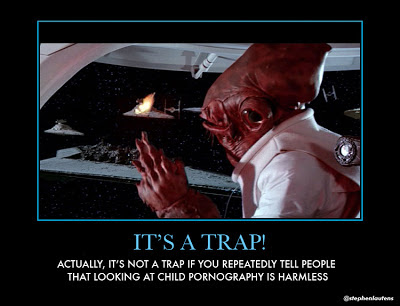Friday, March 8, 2013
It's a Trap! Not Really.
There's already been far too much ink spilled about Prof. Tom Flanagan's "musing" about child pornography. Flanagan was of course Stephen Harper's "Yoda" - one of his influential intellectual mentors in conservative thought. Flanagan managed Harper's leadership campaigns for the Canadian Alliance (2002) and the Conservative Party of Canada (2004). He also managed the Conservative Party’s national election campaign in 2004.
Flanagan's recent quotes almost universally jumped on (and in my view rightly) include: "I certainly have no sympathy for child molesters, but I do have some grave doubts about putting people in jail because of their taste in pictures", and, "It’s a real issue of personal liberty and to what extent we put people in jail for doing something in which they do not harm another person."
The defence to the hue and cry following the remarks (more like a vigorous public tar and feathering) came notably from a few academic friends and National Post columnists, dressing it up as an assault on academic freedom and assuring us that this was professorial rhetoric designed simply to make us think seriously about free speech and personal liberty unrelated to the actual hideous crime of making child pornography for others to possess in the peace and quiet of their own homes.
His handful of defenders conveniently overlooked several inconvenient things. Interestingly, none make reference to another curious spontaneous statement by Flanagan, that "...I got put on a mailing list of the National Man Boy Love Association and I started to get their mailings for a couple of years..." It hangs out there, pleading to be addressed. Who went to the NAMBLA website, paid money (including extra postage to Canada) and put him on the mailing list? Why did he receive it for a "couple of years" without doing something about it? Wouldn't any possible "academic interest" be sated after an issue or two? Would a call to their subscription department end the incoming newsletters when you explained your were on their list in error? He said he didn't think it would work, but apparently never tried. How about the monthly scene at the office or at home when you ask your wife or secretary:
"Any mail today?"
"Just your Man Boy Love Newsletter and the gas bill..."
In a Macleans damage-control interview conducted after test-marketing the first pass defence script he does address (sort of) the NAMBLA newsletter. He said:
"As part of my work, I subscribed to the Heritage Front newsletter to know what these people were doing. It went out of business and they must have sold their mailing list; I suddenly started to get neo-Nazi mailings and the periodical from [NAMBLA]."
So the Nazis - well known for their liberal attitudes towards sexual unorthodoxy - sold their mailing list to NAMBLA, and NAMBLA was willing to pay money for a Nazi mailing list, and then paid more money to send free copies of their newsletter to everyone on it for a couple of years? Excellent cross-marketing. I'm not sure that theory would withstand too much academic peer review since there isn't a shred of evidence or common sense to support it.
There is the previous statement from 2009 reported in The Manitoban: “But that’s actually another interesting debate or seminar: what’s wrong with child pornography — in the sense that it’s just pictures?" Like his 2013 statement, this came out of left field, volunteered by Flanagan and apropos of nothing. It was the comment he was invited to expand upon in the 2013 video, and instead of brushing it off, he jumped into the morass with both feet.
It's these spontaneous statements bursting forth that make it so difficult to suggest Prof. Flanagan was - in his words - "trapped" into making such public utterances. Perhaps he didn't know he was being videoed at the recent seminar, but everyone in the world carries a camera with them now. I can't be sure I'm not being videoed right now.
Did Prof. Flanagan have a reasonable expectation of privacy in his lecture? Doubtful. Was he trapped as he claimed into saying things? There's a big difference in being trapped and being invited to state your opinion, and Prof. Flanagan is no stranger to stating his opinion as a senior political strategist and media commentator.
He and his defenders have tried to portray his statements as mere off the cuff musings and rhetorical intellectual challenges. Scott Ross deals with that revisionist interpretation of the comments, but a read of them shows they are personal opinions ("...I do have some grave doubts...") and he was only "trapped" by his own comments.
All of which is just a long introduction to my own poster that I think sums it up (with apologies to Admiral Ackbar).




